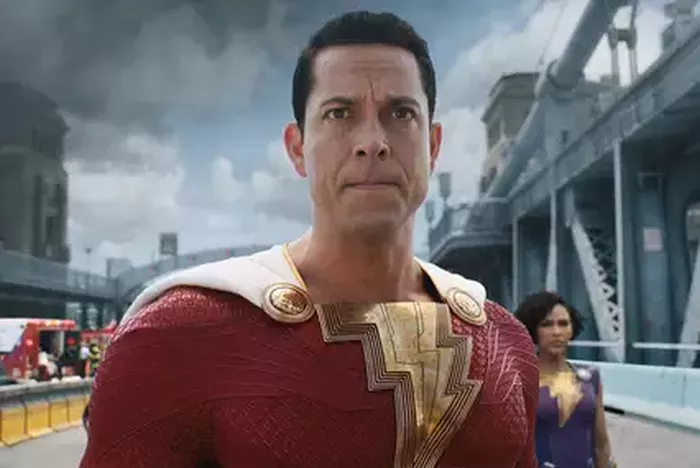In a bold move that has sent shockwaves through the entertainment industry, Zachary Levi, the charismatic leading man of the highly anticipated film “Shazam! Fury of the Gods,” has openly criticized what he calls the “garbage” content emerging from Hollywood. As a prominent figure in the film industry, Levi’s words carry weight, and his stance on the quality of content being produced is generating intense debate.
The Power of a Star’s Voice
Levi’s voice matters. Not just because of his rising stardom, but also due to his sincere dedication to his craft. He has garnered acclaim for his portrayal of the endearing yet powerful superhero, Shazam, in the first installment of the franchise. This unexpected champion of authenticity and quality in entertainment is raising concerns about the direction in which the industry is headed.
Candid Criticism: Speaking Up
In a recent interview, Levi didn’t mince words. He pointed out that many Hollywood projects seemed to lack depth, originality, and genuine emotional impact. While he acknowledged that not every film or series could be groundbreaking, he expressed frustration with the prevalence of formulaic, cash-grab productions that often prioritize flashy visuals over compelling storytelling.
Levi’s candid criticism has resonated with fans and industry insiders alike. Some applaud his bravery in addressing an issue that many have been whispering about behind closed doors. Others, however, view his comments as overly harsh, questioning whether it’s appropriate for a successful actor to criticize his own industry publicly.
Navigating Hollywood’s Challenges
Levi’s concerns about Hollywood’s content quality are not unfounded. In recent years, the industry has seen an influx of reboots, sequels, and adaptations, many of which have failed to capture the magic of their predecessors. This trend, while financially motivated, has left audiences yearning for fresh and innovative storytelling. In a landscape dominated by franchises and superhero sagas, finding original gems can be a challenging task.
However, it’s essential to recognize the complex dynamics at play in Hollywood. It’s an industry driven by profits, where risk-averse studios often prioritize safe bets over experimental, unconventional projects. The competition is fierce, and standing out in a sea of content requires significant marketing and financial resources, often leading to compromises in artistic vision.
The Dilemma of Art vs. Commerce
The tension between art and commerce is a longstanding debate in the entertainment world. Filmmakers and artists often struggle to balance their creative aspirations with the practical realities of budget constraints, box office expectations, and the ever-changing tastes of the audience. While some filmmakers manage to strike this delicate balance, many find themselves constrained by the demands of the market.
Levi’s frustration seems to stem from his desire to see more emphasis on the artistry of filmmaking. He’s not alone in this sentiment. Many industry professionals yearn for the days when original, thought-provoking stories had a greater presence in mainstream cinema. The challenge lies in finding a way to encourage creativity while acknowledging the business aspect of the industry.
A Call for Change
Levi’s criticism can be seen as a call for positive change. He’s not merely pointing out the problems; he’s inviting Hollywood to do better. The industry has a remarkable capacity to adapt and evolve, and Levi’s words might serve as a wake-up call for filmmakers and studios to reevaluate their priorities.
This is an opportunity for Hollywood to revisit its approach to storytelling. A shift towards nurturing original concepts, supporting emerging voices, and taking calculated risks could lead to a renaissance of sorts in the entertainment world. Levi’s passion for the craft and his desire to see the industry flourish should be seen as a valuable contribution to the ongoing discussion about the future of Hollywood.
The Future of Entertainment
As “Shazam! Fury of the Gods” prepares to hit theaters, it’s evident that Zachary Levi is more than just a superhero on-screen. He’s become a symbol of hope for those who believe in the power of genuine storytelling. His outspoken stance on Hollywood’s content quality serves as a reminder that the industry’s true strength lies in its ability to touch hearts, challenge minds, and inspire generations.
It’s now up to Hollywood to decide whether it will heed Levi’s call for change or continue down a path that risks churning out forgettable content. The future of entertainment is at a crossroads, and it’s essential for all stakeholders, from actors and directors to producers and studio executives, to come together and shape an industry that prioritizes both art and commerce, enriching the lives of audiences worldwide.
In a world where superheroes dominate the silver screen, Zachary Levi is proving to be a real-life hero, fighting not just for justice on-screen but for the very soul of an industry that has the potential to be as extraordinary as the stories it tells.
RELEATED READING:
-
The Ultimate Action Movie Collection on Paramount+
-
Gal Gadot’s Dedication: The Journey to Her Snow White Audition
-
Uma Thurman and Maya Hawke: A Dynamic Duo in ‘The Kill Room
-
The Bold Farewell: Ilsa Faust’s Demise in Mission: Impossible — Dead Reckoning
-
From Page to Screen: Red, White & Royal Blue Director Unveils Key Adaptation Choices

